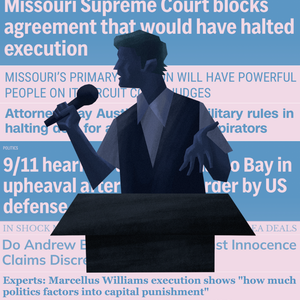
The Fort Worth Star-Telegram announced a change in its stance on the death penalty in a recent editorial marking the 500th execution in Texas. While the newspaper had previously endorsed a moratorium on executions, it now supports the abolition of capital punishment. The editors said that moral grounds alone are enough to warrant ending the death penalty, but they also cited a variety of problems in Texas’s use of the death penalty, including geographical and racial disparities in sentencing, and the state’s “embarassing record of wrongful conviction.” The paper pointed to the decline in death sentences and executions as evidence that the death penalty is no longer necessary, concluding, “Abolishing capital punishment would neither demean the memory of victims nor deny any of them justice. Instead, it would make our society as a whole more just, more morally consistent, and certainly more humane.” Read the full editorial below.
It’s time to halt executions in Texas
The figure 500 is sobering, particularly when it is applied to people and their deaths.
On Wednesday evening, barring intervention by a court or the governor, Texas will carry out its 500th death sentence since capital punishment was reinstated in 1974.
Between 1924 (when the state took charge of executions from its counties) and 1964, the start of a decade-long moratorium, the Lone Star State performed 361 killings by electrocution.
Texas has the bragging rights for its frequency of ultimate punishment, leading the nation even though other states have more inmates on Death Row.
These large numbers represent people, individuals with names who, although convicted of horrible crimes and deserving punishment, should not have their deaths determined by flawed human beings acting in the name of the state.
Kimberly McCarthy, if her sentence is carried out shortly after 6 p.m. Wednesday, will have the distinction of being that 500th person (and only the fourth woman) to be executed in Texas since the death penalty was reinstated.
It is time — in fact, long past — for Texas to get out of the killing business.
A character in an 1889 short story, The Bet by Anton Chekhov, makes a compelling argument during a dinner party debate on capital punishment. He boldly states, “The State is not God. It has no right to take away that which it cannot give back, if it should so desire.”
Precisely.
On moral grounds alone, Texas should abolish capital punishment as six other states have done in the last six years. Maryland become the most recent in May.
Just as the Supreme Court declared in 1972, the death penalty is cruel and unusual punishment, and its application continues to be arbitrary and capricious.
Whether a killer receives a death sentence can vary according to many factors, including the county where the crime occurs. The costs of prosecuting such cases and providing court-appointed lawyers are too high for some counties to absorb. Poor rural counties are less likely than large urban ones to seek the death penalty.
Death Row tends to be occupied by the poor, as rich people seldom are sent there. And minorities are over-represented. Of the 283 people on Texas’s Death Row, 39.2 percent are black, 29.7 percent are Hispanic and 29.7 percent are white, state figures show.
Although no one is certain that an innocent person has ever been executed, Texas has an embarrassing record of wrongful conviction, as evidenced by the number of recent prisoner exonerations.
Progress has been made on limiting executions in certain cases, and in reducing the overall number of capital cases and death sentences. For example, recent Supreme Court rulings prohibit the execution of the mentally ill and people who were under age 18 when the crime was committed.
After 2005, when Texas began allowing prison sentences of life without parole in capital cases, jurors have been more inclined to hand down that sentence instead of death.
Although a Gallup poll shows 63 percent of Americans still favor capital punishment, the number of executions has dropped by more than half in the past 15 years, according to the Death Penalty Information Center.
Texas executed 15 people last year, compared to 40 in 2000. McCarthy, convicted of robbing and murdering a 70-year-old Dallas woman, would become the eighth person to die by lethal injection this year. Seven other executions are scheduled through November.
Proponents of the death penalty argue that it is the appropriate punishment for people who take a life, often in the most heinous way.
The victims, they say, deserve justice, and killing their killers is the best way to mete it out.
Abolishing capital punishment would neither demean the memory of victims nor deny any of them justice. Instead, it would make our society as a whole more just, more morally consistent and certainly more humane.
Texas retired “Old Sparky,” its electric chair, in 1977.
It is time to permanently close our infamous death chamber.
(Editorial, “It’s time to halt executions,” Fort Worth Star-Telegram, June 22, 2013.) See Editorials and New Voices.
Arbitrariness
Nov 05, 2024

DPI Report Provides Valuable Context for 2024 Elections
Arbitrariness
Oct 04, 2024

